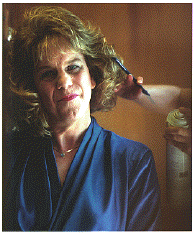Students to learn of
librarian's gender journey
by
Rosalind Bentley
Minneapolis Star Tribune, May 5, 1998
425 Portland Avenue, Minneapolis, MN, 55408
(Fax 612/673-4359)

Students to learn of
librarian's gender journey
by
Rosalind Bentley
Minneapolis Star Tribune, May 5, 1998
425 Portland Avenue, Minneapolis, MN, 55408
(Fax 612/673-4359)


This is an important week for Debra Davis.
On Wednesday, Davis will get up, put on makeup, hose, skirt and blouse and head to the media center of Southwest High School in Minneapolis. Davis will greet students, help them with Internet searches and suggest reference materials for late-term homework.
Davis also will be answering a lot of questions, some pointed, some vague, from students, teachers and, perhaps, parents. Most likely, they will want to know how is it that up until last week, Debra Davis, the woman who runs the library, was known to them as David Nielsen, the man who ran the library.
Quietly, over the past six weeks, Davis and officials of the Minneapolis public schools and other advisers have been putting together a plan to help make the transition from Nielsen to Davis in the workplace. It has not been easy. Their hope is that the change will be minimally disruptive to students, faculty and parents. Davis, a 51-year-old parent of two and grandparent of two, has been teaching and working in Minneapolis public schools for almost 28 years -- all of them as Nielsen.
But gradually, over those years, Davis began dressing and living as a woman in all other aspects of life. In late March, Davis felt the time had come for the duality to end. It was time for people at work to know what Davis believes to be a personal truth -- that Davis is transgender, male to female.
In other words, Davis, born a male, identifies as a woman.
"The only things that will change about this employee are how she looks, her name and the pronouns that are used when referring to her," school officials tell parents in a letter being sent today.

 Return to Debra Davis page
Return to Debra Davis page
 Return to GEC home page
Return to GEC home page